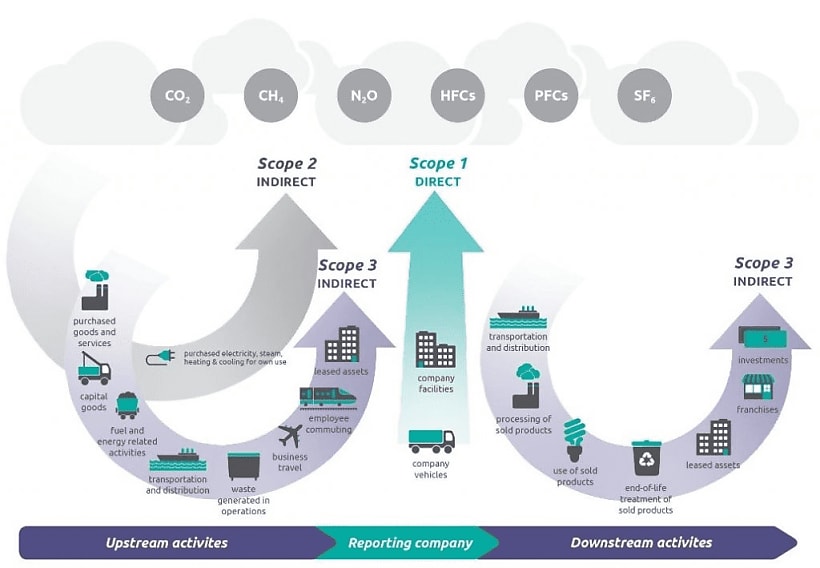The Corporate Sustainability Reporting Directive, or CSRD, takes effect this month. This new EU regulation requires companies to report on risks and opportunities arising from social and environmental issues, such as climate change, and on the impact of their activities on people and the environment.
It can be challenging to understand what the CSRD requires from you as a small or medium fleet. So, we’ll walk you through the most essential details in this post. We’ll also highlight why it’s important to keep the perspective of your larger customers in mind.
Want a quick guide to CSRD instead?
Get our free and simple guide to fleet emissions reporting.
A quick history
The CSRD builds upon—and essentially replaces—the Non-Financial Reporting Directive (NFRD), which the EU introduced in October 2014. As with the NFRD, the CSRD aims for greater transparency and accountability around social and environmental reporting. Here are two key differences between the older and newer forms of legislation:
The NFRD applied only to public-interest entities, typically stock-listed companies, banks and insurance companies with more than 500 employees. Over the next few years, the CSRD will bring far more companies into the regulatory fold. Different types of businesses will be affected by the regulation at different times, with many thousands of companies across the continent obliged to comply with it.
Whereas large companies determined reporting standards under the NFRD, it will now be standardised.
The CSRD is an aspect of the European Green Deal, a set of policies aiming to reduce greenhouse gas (GHG) emissions by at least 55% by 2030, compared to 1990 levels.
What the CSRD means for your small or medium fleet
Transport accounts for nearly a quarter of GHG emissions in the EU. Within the CSRD, certain companies must report on how much direct and indirect CO2 emissions they produce—including those caused by their fleets.
There’s a timeline as to when companies will be required to comply with the CSRD. We’ll share that timeline below, but it’s first important to outline the business context that goes with it:
Even if your business is not obliged to report on its own carbon footprint in the short term, you could be asked by your larger customers to provide information on your vehicle CO2 emissions when delivering goods or services to them. This is because they will need to report on those indirect emissions to comply with the CSRD and avoid potential penalties.
Your larger customers are highly likely to have strict policies around limiting their indirect emissions. So, the ability to provide accurate data on your fleet emissions can become a competitive advantage for you in the coming years.
Eventually, the CSRD will apply to most businesses. Knowing what’s required now—and how to go about it—will give you a head start in complying with the regulation.
A compliance timeline
Important to note: whilst UK companies are not directly affected by the CSRD, those with EU subsidiaries meeting the criteria listed below will be required to report.
- 2024: Stock-listed companies with more than 500 employees must record CO2 emissions for 2025 reporting.
- 2025: Non-stock listed companies that meet 2 out of the following 3 criteria must record CO2 data for 2026 reporting:
- More than 250 employees
- More than €50 million in revenue
- More than €25 million in total assets
- 2026: Stock-listed small/medium enterprises with 2 out of the following 3 criteria must record CO2 data for 2027 reporting:
- More than 10 employees
- More than €900,000 in revenue
- More than €450,000 in total assets
- 2027: Companies with a non-EU parent and more than €150 million in EU turnover must start recording CO2 data for reporting.
Additionally, the Financial Conduct Authority (FCA) requires major listed companies in the UK to report on their direct and indirect climate impact through the TCFD framework (CSRD equivalent for the UK). Learn more about TCFD and whether this affects your company.
How to support compliance for your customers
From the perspective of your major customers, the CSRD goes beyond reporting. It’s about understanding, anticipating and acting on emissions throughout the value chain. This graphic from Greenhouse Gas Protocol illustrates how that works:

Keeping your customers’ perspective in mind can help you prepare to do two things:
- Provide accurate information on your fleet vehicle emissions when your customers ask for it
- Find ways to reduce your fleet emissions, which helps your customers meet their CSRD benchmarks while ensuring your business advances its own sustainability benchmarks
These are big tasks, we know. Luckily, there’s a simple and stress-free way to get them done. With tools like our CO2 Report, which is based on TÜV-certified methods, Webfleet customers can quickly pull the emissions data they need—all it takes is a few clicks to get the right information. From their Webfleet dashboard, our customers can also get the actionable insights they need on KPIs like fuel consumption and driving behaviour.
Could you use some help getting started with CSRD reporting or reducing your fleet emissions? More than 60,000 businesses worldwide rely on Webfleet to improve fleet efficiency, support drivers, boost safety, stay compliant and work more sustainably. Take advantage of our expertise in fleet sustainability and request a free consultation with us right now.








